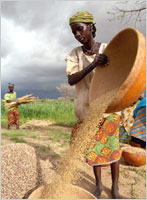default header
26 October 2006
Millennium Challenge Corporation Approves $461 Million for Mali
Senior U.S. officials discuss trade issues with West African counterparts

Washington -- The board of directors of the U.S. Millennium Challenge Corporation (MCC) October 26 announced approval of a five-year, $461 million agreement to fund poverty reduction projects in Mali.
The major development agreement, known as a compact, aims to reduce poverty in the West African country through economic growth by increasing agricultural production and fostering small- and medium-size enterprises, as well as expanding its access to markets and trade, according to an MCC press release.
The MCC said the investment will support the development of key infrastructure and policy reforms to address Mali’s constraints on growth by capitalizing on two of the country’s major assets: the Niger River, for irrigated agriculture, and the Bamako-Sénou International Airport, a gateway for regional and international trade.
Mali currently ranks as one of the poorest countries in the world, with an average per capita income of $380. The country long has been dependent on low-value agricultural products, the MCC said, including cereal crops, livestock and fish, which are vulnerable to erratic weather patterns. This difficult economic situation has been compounded by a small and constrained industrial base and the fact that Mali is land-locked and isolated from international markets and trade.
“Infrastructure deficiencies are often among the major barriers to poverty reduction and economic growth in Africa," said MCC's chief executive officer, Ambassador John J. Danilovich.
The comprehensive plan of action in the Mali-MCC compact "addresses specific infrastructure constraints to growth" and "will have very promising ramifications for the business and agriculture sectors," Danilovich said. "We congratulate the Malians on their tremendous efforts to create this compact and welcome working with them toward achieving its significant goals,” he added.
The largest component of the compact is the $234.6 million Alatona irrigation project, which is expected to increase crop and food production, improve land tenure security, modernize irrigated production systems and mitigate the uncertainty from subsistence rain-fed agriculture.
The project, according to the MCC, seeks to develop 16,000 hectares of newly irrigated lands and represents an almost 20 percent increase in “drought-proof” agriculture in the Office du Niger area, which contains one of the oldest and largest irrigation schemes in sub-Saharan Africa, begun by the French in 1932.

"The Alatona irrigation project will introduce innovative agricultural, land tenure, credit and water management practices, as well as policy and organizational reforms aimed at realizing the Office du Niger’s potential to serve as an engine of rural growth for Mali," according to a fact sheet accompanying the press release.
Additionally, an $89.6 million airport improvement project will remove constraints to air traffic growth and increase the airport’s efficiency in both passenger and freight handling through improved infrastructure and more effective management. Co-located with the airport in Bamako will be a $94.6 million industrial park project that will establish an anchor for a growing industrial sector, particularly in agro-processing.
The compact also includes support for program management, oversight and monitoring and evaluation, totaling $42.3 million.
Hundreds of thousands of Malians are expected to see improvements in their standard of living as a result of the compact, the MCC said. Approximately 40,000 farmers, family members and laborers, as well as 100,000 school-age children and their family members, will have greater access to education, health services, markets and potable water provided in the irrigation zone. In addition, some 85,000 new jobs are expected to develop because of increased manufacturing and trade.
The Millennium Challenge Corporation was established by President Bush on January 23, 2004, in the belief that assistance is best used when it helps people achieve their own development objectives within a framework of sound political, economic and social policies.
Congress provided nearly $1 billion in initial funding for fiscal year (FY) 2004. The president requested $3 billion for FY 2007 and has pledged to increase annual funding to $5 billion in the future.
To date, the MCC has signed compacts with Armenia, Benin, Cape Verde, Georgia, Ghana, Honduras, Madagascar, Nicaragua and Vanuatu.
Separately, U.S. Trade Representative Susan C. Schwab and other senior administration officials met October 25 with their counterparts from Benin, Burkina-Faso, Chad and Mali to discuss a range of trade-related issues.
The officials discussed the importance of restarting the stalled World Trade Organization Doha Development Agenda negotiations, the important contributions a successful agreement will make to economic development and issues related to cotton trade.
"The talks provided a chance to discuss how trade liberalization is the best way to achieve the development goals of the Doha Round," said Schwab. "The United States remains fully committed to a comprehensive, multilateral agreement. We look forward to continuing to work with our trading partners from these four countries on an agreement that will increase trade flows, create new economic opportunities and alleviate poverty throughout the world."
For additional information, see Millennium Challenge Account and USA and the WTO.
(The Washington File is a product of the Bureau of International Information Programs, U.S. Department of State. Web site: http://usinfo.state.gov)
